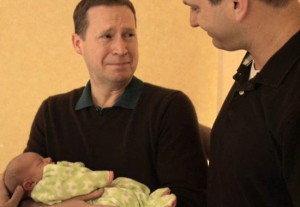 A new reality series debuting tonight on Logo looks into the tension-filled days when couples are about to adopt babies from women who may or may not change their mind about the exchange.
A new reality series debuting tonight on Logo looks into the tension-filled days when couples are about to adopt babies from women who may or may not change their mind about the exchange.
“The Baby Wait” (Logo, 9 p.m.) begins with an episode about a New York couple, Mark Kreiger and Paul Siebold, who travel to Connecticut to adopt a baby from an 18-year-old from Plainfield, Conn., Genavieve Diggs.
Connecticut is a state that gives birth mothers 30 days to terminate an adoption, causing some worry among the couple, who quickly fall for the newborn baby, Morgan.
“For me, the 30 days was it was the longest month that I’ve had to go through,” Genavieve told reporters at the TV critics press tour in California earlier this month. “Because there were times where I was I would be sitting in my room crying, looking at ultrasound pictures or looking on my computer at her pictures and, like, ‘I want her back.’
“But at the same time, I had another conflict, basically, saying, ‘Well, you know, you may want her back. It would be best for me, for the way I feel, but it wouldn’t be best for her.’ And so I guess that’s what basically stopped me from trying to get her back, because I really didn’t have any way to take care of her. You know, I didn’t want to raise her on welfare, Section 8, food stamps. That wouldn’t be fair to her. I wanted her to have the best life she could possibly have.”
“It is a long time,” adoptive parent Krieger said of the 30 day waiting period. “We actually, during that time, had a three week waiting period where we had to stay in Connecticut while the interstate paperwork was completed. So there are distractions as well for us during that 30 days where we’re parenting Morgan and we’re in a hotel room and we don’t have our things. We’re not even really home.”
“As you’re bonding with the child,” said Siebold, “all these hopes and dreams started bubbling up for us and, I might say, expectations for her too. But she when you’re building those and you have those 30 days, it’s always in the back of your mind, ‘What if Gen calls?’
“But we were secure that that 30 days was put in for a very good reason,” he added. “A lot of states have that for a very good reason. And I would feel incredibly terrible if the revocation period was four days and, on the fifth day, she decided, ‘Oh, I made a really bad mistake.’ I couldn’t live with that.
“So for the 30 days, although it was very nail biting and I’m surprised I have any hair left, I really feel good for Genavieve that she had a long waiting period to really think about it.”
Being on reality TV was a secondary consideration for all the parties involved. But Genavieve said she the cameras made it easier for her to focus on her task at hand, “so I wasn’t just focused on being depressed or being sad. I had something to do. So honestly, for me, it made it a lot better. And it was a good experience too.”
For the adoptive parents, “I think it was important for us to show the process and that a lot of birth parents make the right decision,” Siebold said. “So I think we’re showing what true life is in this instance.”
“The Baby Wait” is produced by the team behind “16 and Pregnant” and “Teen Mom,” who employ some of the same techniques to get the vulnerable young women to open up before the camera.
“Trust is important in any show, and we do not take the trust Genavieve gave us lightly,” said co-producer Liz Gateley. “It’s always important that we’re very honest about the process straight from the top.
“This show does not focus exclusively on teen mothers,” Gateley said. “Genavieve happened to be one, but there are mothers in the series who are in their twenties that already have children that are choosing to adoption for their other children. But yeah, it’s very important to talk through with a young woman exactly what’s going to happen and why we want to cover their story and as well as their parents. It’s really important you know Marian, Genavieve’s mom, was an important part of the process. And the family is a very precarious relationship that you need to hold with kid gloves the whole way.”
Trust is more important in “The Baby Wait” than “in shows that we’ve done in the past,” co-producer Tony DiSanto added. “Because here you’re dealing with not just the mother; you’re dealing with also a couple that is obviously in a very sensitive situation and has been through, you know, a lot trying to have a child. And that’s something, you know, that you don’t take lightly. And I think that we need to build a mutual trust to even allow a show like this to happen.”
Other stories in “The Baby Trust” will take them to Kansas, Alabama and Pennsylvania and not all the adopting couples will be gay, Gateley said.